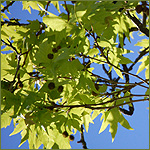Warmer temperatures and longer dry spells have killed thousands of trees and shrubs in a Southern California mountain range, US research shows.
 A study by scientists at the University of California, Irvine also found that the shift in climate had pushed the plants’ habitat an average of 65 metres (213ft) up the mountain over the past 30 years.
A study by scientists at the University of California, Irvine also found that the shift in climate had pushed the plants’ habitat an average of 65 metres (213ft) up the mountain over the past 30 years.
A Science Daily report said the study showed that white fir and Jeffrey pine trees died at the lower altitudes of their growth range in the Santa Rosa Mountains, from 1,950 metres to as high as 2,195 metres (6,400 to 7,200ft).
It also found that California lilacs had died out between 1,220 to 1,460 metres (4,000 to 4,800ft).
The researchers also showed that almost all of the plants examined in the study had crept up the mountain by a similar distance, countering the belief that slower-growing trees would move more slowly than faster-growing grasses and wildflowers.
This study, the researchers said, was the first to show directly the impact of climate change on a mountainous ecosystem by physically studying the location of plants.
They added that it offered an insight into what could occur globally if the Earth’s temperature continued to rise.
The finding also had implications for forest management, the team reported, as it ruled out air pollution and fire suppression as main causes of plant death.
“Plants are dying out at the bottom of their ranges, and at the tops of their ranges they seem to be growing in and doing much better,” said lead author Anne Kelly, lead and a graduate student from the university’s Department of Earth System Science.
“The only thing that could explain this happening across the entire face of the mountain would be a change in the local climate.”
The study was published in the online section of the journal Proceedings of the National Academy of Sciences (PNAS).
Source: Science Daily
Date: 15/08/2008
Filed under: climate change, research, Uncategorized | Tagged: california, climate change, mountains, research, tree deaths, university of california irvine, US | 1 Comment »





